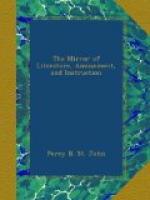It is said that the art of writing, and the use of manageable writing materials, were entirely, or all but entirely, unknown in Greece and the islands at the supposed date of the composition of the Iliad; and that if so, this poem could not have been committed to writing during the time of such its composition; that in a question of comparative probabilities like this, it is a much grosser improbability that even the single Iliad, amounting, after all curtailments and expungings, to upwards of 15,000 lines, should have been actually conceived and perfected in the brain of one man, with no other help but his own or others’ memory, than that it should, in fact, be the result of the labours of several distinct authors; that if the Odyssey be counted, the improbability is doubled; that if we add, upon the authority of Thucydides and Aristotle, the Hymns and Margites, not to say the Batrachomuiomachia, that which was improbable becomes absolutely impossible; that all that has been so often said as to the fact of as many lines, or more, having been committed to memory, is beside the point in question, which is not whether 15,000 or 30,000 lines may be learnt by art from a book or manuscript, but whether one man can compose a poem of that length, which, rightly or not, shall be thought to be a perfect model of symmetry or consistency of parts, without the aid of writing materials; that, admitting the superior probability of such a thing in a primitive age, we know nothing analogous to such a case; and that it so transcends the common limits of intellectual power, as, at the least, to merit, with as much justice as the opposite opinion, the character of improbability.—H.N. Coleridge.
* * * * *
LIBERALISM AND MUSIC.
It seems that the day is come again when musical airs are ranked in political importance with proclamations, manifestoes, &c. Everybody knows the story of the Swiss hired troops, the Ranz des Vaches, and the prohibition of this tune in France. A Polish air, the Dombrowski Mazourka, which the regiment of General Szembek played on entering Warsaw, has been forbidden by the Grand Duke Constantine, on pain of a penalty of 400 florins; the consequence of which is, that it has become the outward and audible sign of patriotism in every part of Poland; just as the Marseilles March and la Parisienne are in France and the Netherlands the signals of liberalism. During Mr. Pitt’s administration an organ grinder was committed to Newgate for playing “Ah! ca ira” in the streets. This was a silly step; but the fellow excited little commiseration, for the tune was the war-whoop of a few savages who were at that time deluging France with blood. It affords another proof, however, of the power ascribed by statesmen to instrumental music, uninterpreted by words in exciting ideas and producing associations.—Harmonicon, Feb. 1.




